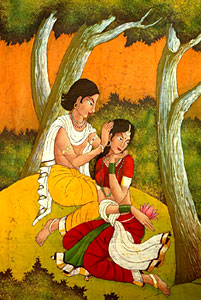As per Hindu legends, Nala was the king of Nishada. The king Nala is mentioned in a part of the third book of Mahabharata.
The place Nishada was called Nalopakhyanam then. Nala possessed all the noble qualities that a dignified Indian ruler needed. Thus for his mesmerizing qualities he was recognized.
 There is a story of the love life of Nala. Damayanti was the only daughter of the king of Berar. She was very beautiful and gentle and Nala fell in love with her. Nala and Damayanti became mutually captivated of each other from the mere fame of each other`s virtues.
There is a story of the love life of Nala. Damayanti was the only daughter of the king of Berar. She was very beautiful and gentle and Nala fell in love with her. Nala and Damayanti became mutually captivated of each other from the mere fame of each other`s virtues.
Damayanti favored Nala to Lord Indra, Sani, and two other demi-gods who became incarnate for the purpose of attending the Swayamvara of the princes. Sani was infuriated at Damayanti`s refusal to marry him. Sani, malevolent being, ill-treated the royal couple with great hatred. With his cunning mind he caused Nala to lose his kingdom by gambling. He banished him to the wilderness.
Later Nala took Damayanti into the forest. But not being willing to cause her so much suffering as a life in the woods involves, he resolved to leave her alone. When she was sleeping under a tree, Nala left him and went away thinking she would then return to her father`s house.
Nevertheless Damayanti did not go to his father`s house but lamenting she soughted her husband. When she could not find him she went to a certain king and became maid of honour to the queen. At the same time as Nala wandered about and became so black he could no longer be recognized as king Nala.
At last Nala became cook to the king at whose court Damayanti lived. He was such a competent cook that his skill in cooking has become a proverb. In the end he was caught by his faithful spouse as king Nala. Having soon recovered his former pleasing appearance he also regained his throne.
Nala is also the name of a prince who was the son of Yadu.
Again Nala is the name of a river that falls into the Ganges.












